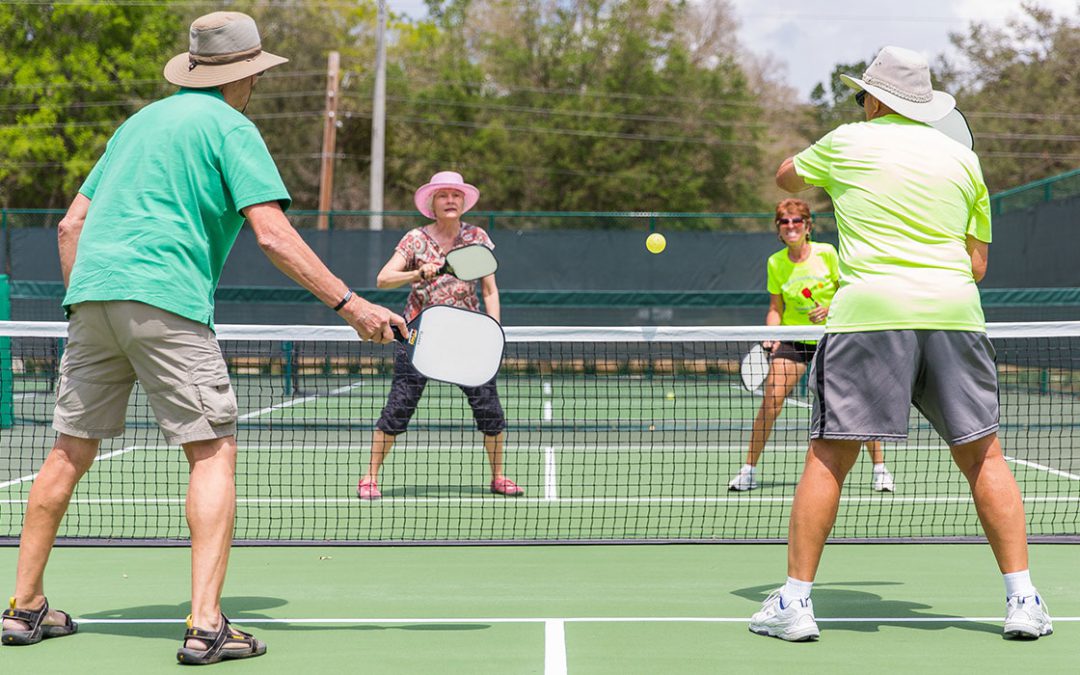As one of the fastest growing sports in America, pickleball has something to offer all ages and abilities, from fitness and competition to just plain fun on the court, says Hillsboro physical therapist Nancy Causton.
“Because of the small court size and the speed at which it is played, you don’t have to be a world-class athlete or tall or short or fast,” said Causton, Clinic Director at Impact Physical Therapy of Hillsboro. “Most people play doubles so you have four people on the court and you can laugh and joke and have fun.”
As people enjoy the game, they’re also experiencing important fitness benefits from the sport – benefits that can be enhanced through improved preparation, strength and flexibility, Causton added.
A racquet-style sport that mimics tennis, but on a smaller court using paddles and a wiffle-like ball, pickleball was invented on Washington’s Bainbridge Island in 1965. While relatively dormant for years, the sport’s popularity has taken off as of late, growing by 650 percent over the last six years, according to the USA Pickleball Association (USAPA).
A large part of this growth can be attributed to the inclusive nature of the sport. With small courts and shorter games (the average lasts about 15 minutes, according to Causton), pickleball is often a draw for older adults.
In fact, the USAPA says about 75 percent of those who play pickleball are 55 years and older. These players are reaping some incredible physical and mental benefits from the sport.
“Playing pickleball keeps bones strong, keeps joints flexible, and it helps with balance, all of which are especially important for those getting up there in age,” she said. “There is also the social aspect of staying engaged with community and developing friendships.”
Of course, as older people take on a new activity like pickleball, Causton points out that the experience can be made safer and the physical benefits improved with the help of a physical therapist. For instance, a physical therapist can work with a pickleball player to:
Build Strength
As the game requires quick reaction, movements, and changes in direction, it can quickly shine a spotlight on weaknesses in the body. A strength assessment with a physical therapist can help pinpoint one’s body weaknesses beforehand, then provide a personalized regimen for addressing these weaknesses to avoid injury.
Improve Flexibility
According to Causton, pickleball requires the body to bend and reach in many different directions, putting one’s flexibility to the test. As with strength, a physical therapist can assess your body’s flexibility as it relates to the sport, then prescribe effective stretches that address hip mobility, lumbar flexibility and knee motion – areas of the body that are necessary for optimal range of motion within a typical pickleball game.
Establish a Warm-Up Routine
A proper warm-up is essential to ensure optimal performance in competition as well as preventing discomfort, pain and injury during play. Yet, Causton says a good number of people still don’t warm up properly for their activities of choice. As they address strength and flexibility issues, a physical therapist will also teach pickleball players a proper dynamic warm-up routine for the sport.
Stay Out of a Pickle
Finally, a physical therapist can help prevent injuries that may happen on the court, such as back sprains, Achilles tendon tears or strains. Causton said that during an evaluation, physical therapists can spot areas on individual bodies that may need attention, then provide relevant solutions.
“An evaluation by a physical therapist will assess your preparedness, your flexibility and strength, and lead to some guidelines to ensure your success with this activity,” Causton said. “This will help make the sport of pickleball a safe and fun opportunity to connect with others while giving you your competitive fix.”
Causton and the physical therapy team at Impact Physical Therapy of Hillsboro already provides some of this guidance through their involvement with the Hillsboro Community Pickleball group. At past events, physical therapists have demonstrated warm-ups and stretches that can benefit play, prevent injury and maximize fun.

